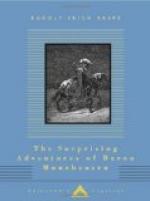He was already an excellent English scholar, so that when he reached London it was not unnatural that he should look to authorship for support. Without loss of time, he published in London in 1776 a volume on some German Volcanoes and their productions; in 1777 he translated the then highly esteemed mineralogical travels of Ferber in Italy and Hungary. In 1780 we have an interesting account of him from Horace Walpole, who wrote to his friend, the Rev. William Mason: “There is a Dutch scavant come over who is author of several pieces so learned that I do not even know their titles: but he has made a discovery in my way which you may be sure I believe, for it proves what I expected and hinted in my ‘Anecdotes of Painting,’ that the use of oil colours was known long before Van Eyck.” Raspe, he went on to say, had discovered a Ms. of Theophilus, a German monk in the fourth century, who gave receipts for preparing the colours, and had thereby convicted Vasari of error. “Raspe is poor, and I shall try and get subscriptions to enable him to print his work, which is sensible, clear, and unpretending.” Three months later it was, “Poor Raspe is arrested by his tailor. I have sent him a little money, and he hopes to recover his liberty, but I question whether he will be able to struggle on here.” His “Essay on the Origin of Oil Painting” was actually published through Walpole’s good service in April 1781. He seems to have had plans of going to America and of excavating antiquities in Egypt, where he might have done good service, but the bad name that he had earned dogged him to London. The Royal Society struck him off its rolls, and in revenge he is said to have threatened to publish a travesty of their transactions. He was doubtless often hard put to it for a living, but the variety of his attainments served him in good stead. He possessed or gained some reputation as a mining




